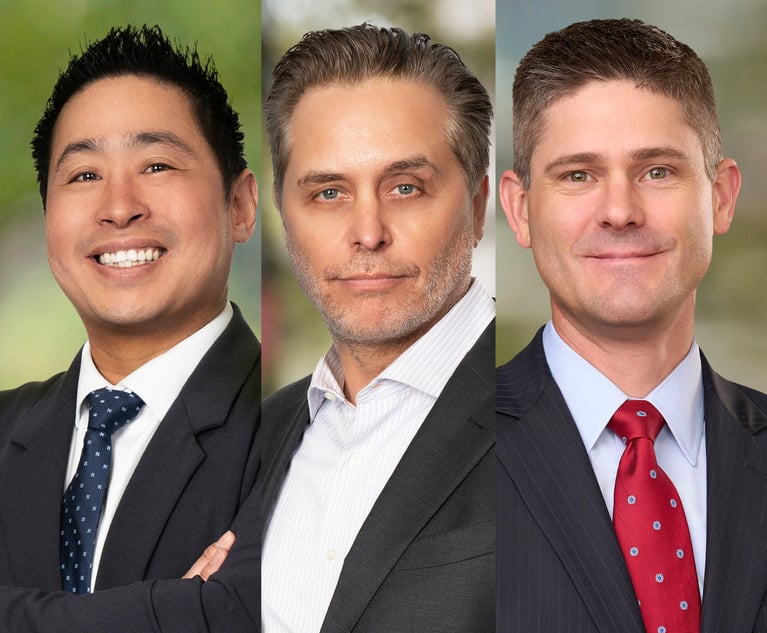In Gender Discrimination Case, Twitter Says There's No Certifiable Class or Viable Lead Plaintiff
Twitter's lead lawyer, Orrick's Lynne Hermle, told a state court judge in San Francisco that the plaintiff couldn't show that the company's promotion practices caused a disproportionate number of women software engineers to be passed over for promotions.
May 09, 2018 at 07:03 PM
4 minute read
 Twitter headquarters, located at 1355 Market St, San Francisco. (Photo: Jason Doiy/ALM)
Twitter headquarters, located at 1355 Market St, San Francisco. (Photo: Jason Doiy/ALM)
SAN FRANCISCO—Lawyers for Twitter Inc. pushed back against an attempt to certify a class of female engineers in a gender discrimination case Wednesday.
Twitter's lead lawyer, Lynne Hermle of Orrick, Herrington & Sutcliffe, told San Francisco Superior Court Judge Mary Wiss that the plaintiff couldn't show that the company's promotion practices caused a disproportionate number of women to be passed over for promotions.
The lawsuit, brought on behalf of former Twitter engineer Tina Huang who joined the company in 2009 as one of its first female software engineers, seeks to certify a class of 135 current and former women employees who held similar positions. Huang and her lawyers at San Francisco's Lohr Ripamonti & Segarich claim that Twitter managers used subjective criteria for promotion into senior positions, which led to discrimination against female candidates.
Huang's lead lawyer, Jason Lohr, said at Wednesday's hearing that Twitter was attempting to treat the class certification stage of the case as summary judgment by raising evidentiary issues.
“It's a procedural motion and the standards are very different,” Lohr said.
Lohr said that, at this stage, the appropriate question is whether Huang's claims were typical of the class, whether the case presents common questions of fact and law and whether a single case is superior to 135 single cases. He also said that all plaintiffs can claim that Twitter's promotional practices led to a disparate number of women remaining in the lower rungs of the company's eight-tier hierarchy for software engineers.
In particular, he pointed to the company's practice having supervisors act as “gatekeepers” who suggest which employees are eligible for promotion, and its subjective criteria requiring candidates to be judged by the impact their work had on the company and how that was accomplished.
Hermle, however, pointed out that Huang's statistical expert hadn't reviewed Twitter's policies or any deposition testimony, but had relied purely on information provided to him by Lohr. That reliance, Hermle contended, meant that the statistical evidence that the plaintiff put forward was inadmissible.
“There's nothing scientific about it,” Hermle said. “There's nothing that would have allowed a reasonable expert to rely on it.”
Wiss, for her part, seemed troubled that some of the potential class members had sat on internal Twitter committees who considered the promotion prospects of other class members.
“Why doesn't that create a conflict?” Wiss asked Lohr.
Lohr replied that the peer-review process at Twitter was typical of the industry and that, since all the prospective class members were female software engineers, all faced statistically dimmer prospects for promotion than their male colleagues.
Wiss, who did little to tip her hand one way or the other at Wednesday's hearing, also asked each side what she should do about the fact that 73 of the proposed class members either had agreed to arbitrate any claims against the company or had entered agreements upon leaving Twitter to waive future claims. Lohr said that those were issues that could be handled after a class is certified, class members are notified, and the parties see who opts out of the suit.
But Hermle said that fact that Huang has neither an arbitration agreement nor a waiver of claims leaves her unsuitable to represent those who do. She said that the fact the plaintiffs had not put forward another class representative who could represent plaintiffs in those positions after three-and-a-half years of litigation was telling.
“If the plaintiff wanted to have someone who is adequate and typical I would have expected that person to surface long before today,” Hermle said.
This content has been archived. It is available through our partners, LexisNexis® and Bloomberg Law.
To view this content, please continue to their sites.
Not a Lexis Subscriber?
Subscribe Now
Not a Bloomberg Law Subscriber?
Subscribe Now
NOT FOR REPRINT
© 2025 ALM Global, LLC, All Rights Reserved. Request academic re-use from www.copyright.com. All other uses, submit a request to [email protected]. For more information visit Asset & Logo Licensing.
You Might Like
View All
White & Case KOs Claims Against Voltage LLC in Solar Companies' Trade Dispute

Goodwin Procter Relocates to Renewable-Powered Office in San Francisco’s Financial District

Polsinelli Picks Up Corporate Health Care Partner From Greenberg Traurig in LA

Perkins Coie Lures Former Longtime Wilson Sonsini Tech Transactions Partner
Trending Stories
- 1Pogo Stick Maker Wants Financing Company to Pay $20M After Bailing Out Client
- 2Goldman Sachs Secures Dismissal of Celebrity Manager's Lawsuit Over Failed Deal
- 3Trump Moves to Withdraw Applications to Halt Now-Completed Sentencing
- 4Trump's RTO Mandate May Have Some Gov't Lawyers Polishing Their Resumes
- 5A Judge Is Raising Questions About Docket Rotation
Who Got The Work
J. Brugh Lower of Gibbons has entered an appearance for industrial equipment supplier Devco Corporation in a pending trademark infringement lawsuit. The suit, accusing the defendant of selling knock-off Graco products, was filed Dec. 18 in New Jersey District Court by Rivkin Radler on behalf of Graco Inc. and Graco Minnesota. The case, assigned to U.S. District Judge Zahid N. Quraishi, is 3:24-cv-11294, Graco Inc. et al v. Devco Corporation.
Who Got The Work
Rebecca Maller-Stein and Kent A. Yalowitz of Arnold & Porter Kaye Scholer have entered their appearances for Hanaco Venture Capital and its executives, Lior Prosor and David Frankel, in a pending securities lawsuit. The action, filed on Dec. 24 in New York Southern District Court by Zell, Aron & Co. on behalf of Goldeneye Advisors, accuses the defendants of negligently and fraudulently managing the plaintiff's $1 million investment. The case, assigned to U.S. District Judge Vernon S. Broderick, is 1:24-cv-09918, Goldeneye Advisors, LLC v. Hanaco Venture Capital, Ltd. et al.
Who Got The Work
Attorneys from A&O Shearman has stepped in as defense counsel for Toronto-Dominion Bank and other defendants in a pending securities class action. The suit, filed Dec. 11 in New York Southern District Court by Bleichmar Fonti & Auld, accuses the defendants of concealing the bank's 'pervasive' deficiencies in regards to its compliance with the Bank Secrecy Act and the quality of its anti-money laundering controls. The case, assigned to U.S. District Judge Arun Subramanian, is 1:24-cv-09445, Gonzalez v. The Toronto-Dominion Bank et al.
Who Got The Work
Crown Castle International, a Pennsylvania company providing shared communications infrastructure, has turned to Luke D. Wolf of Gordon Rees Scully Mansukhani to fend off a pending breach-of-contract lawsuit. The court action, filed Nov. 25 in Michigan Eastern District Court by Hooper Hathaway PC on behalf of The Town Residences LLC, accuses Crown Castle of failing to transfer approximately $30,000 in utility payments from T-Mobile in breach of a roof-top lease and assignment agreement. The case, assigned to U.S. District Judge Susan K. Declercq, is 2:24-cv-13131, The Town Residences LLC v. T-Mobile US, Inc. et al.
Who Got The Work
Wilfred P. Coronato and Daniel M. Schwartz of McCarter & English have stepped in as defense counsel to Electrolux Home Products Inc. in a pending product liability lawsuit. The court action, filed Nov. 26 in New York Eastern District Court by Poulos Lopiccolo PC and Nagel Rice LLP on behalf of David Stern, alleges that the defendant's refrigerators’ drawers and shelving repeatedly break and fall apart within months after purchase. The case, assigned to U.S. District Judge Joan M. Azrack, is 2:24-cv-08204, Stern v. Electrolux Home Products, Inc.
Featured Firms
Law Offices of Gary Martin Hays & Associates, P.C.
(470) 294-1674
Law Offices of Mark E. Salomone
(857) 444-6468
Smith & Hassler
(713) 739-1250






